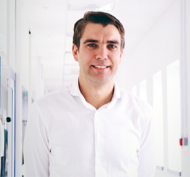Richard Murray MPhys Physics, 2006. Physics PhD, 2010
CEO and co-founder, ORCA Computing

In 2019, myself and Professor Ian Walmsley co-founded ORCA computing, a company building quantum computers based on single photons. I’m now working as CEO and co-founder leading a team of 15 of the world’s best scientists and engineers.
Quantum computers are at the forefront of modern science and technology, and through our work at ORCA, we have built a completely new way to build them. Though the route to fault-tolerant quantum computers is long- probably a decade or more- ORCA is building non fault-tolerant devices and are already finding applications of these in machine learning.
I led the UK government’s quantum technologies programme. The highlight from that, I think, was being part of a small team who established the EU’s €1 billion quantum technologies flagship programme.
I’ve had an exciting career since finishing my PhD in 2010, which has included establishing the EU’s €1 billion quantum technologies flagship programme.
My Southampton highlights: quantum mechanics, study groups with friends and hot summer days
When studying physics, there are some modules that really open up your mind to fantastic new concepts and ideas. My first introduction module in quantum mechanics was one – and the moment when you derive the structure of the periodic table from the bottom up, working with quantum atomic orbitals, is one I will never forget. This carried on into my PhD, when the discoveries become your own. There are also lots of personal moments that I cherish – study groups with my friends, sitting out on the grass during hot summer days and exploring the Hartley library.
I was also a member of the university swim, mountain biking and tennis teams, so my Wednesday afternoons were normally very busy!
Becoming a scientist at Southampton
Before my time at Southampton, I would say that I didn’t really know what physics was, and certainly wasn’t a scientist. Through my undergraduate degree, and my PhD, I was made into a scientist.
In addition to my pure technical knowledge, while at Southampton, I grew to deeply understand and apply the scientific method of breaking apart very complex problems, simplifying, and then finding solutions. This is a skill which is core to how I approach problems that I encounter. I apply this irrespective of whether it be a scientific, business or even personal problem. Even today, it gives me an advantage over others who haven’t learnt that skill, and quite often, I am able to understand concepts, and spot things that others miss.
An exciting career in technology development
Following my PhD, I went to work at the technology development company TTP. While there, I started to learn more about technology development in industry; working on a number of exciting new products, including a nano-structured drag reducing (‘Sharkshin!’) coating technology for Boeing, which I later got to trial at Boeing’s site in Seattle. I developed contact lenses which electronically switch between reading glasses and distance vision for Novartis, and new coating technologies for Oakley in California. More recently, went to work for Innovate UK leading the UK government’s quantum technologies programme. The highlight from that, I think, was being part of a small team who established the EU’s €1 billion quantum technologies flagship programme. Although the timing of that programme wasn’t great for my own career, it went on to support universities and researchers across Europe and (just recently) the UK to collaborate and develop quantum sensors, networks and computers. After Innovate UK I toured many quantum academics, talking to them about starting a company. In the end, I met Professor Ian Walmsley, and together we co-founded ORCA computing. The company is expanding rapidly to make quantum optics a leading contender for scalable quantum computing.
My advice to current students
You’ll only have one shot at going through university, so make it count. Work as hard as you can, do as much extra-curricular activity as you can, and you’ll thank yourself for the extra effort later in life. Above all else, make sure you enjoy yourself.
Try to develop a ‘T’ shaped knowledge. This means develop both very specific knowledge about a particular subject matter, but also a broader knowledge which might cover other subjects, such as other areas of science, and politics, economics, english and mathematics. You’ll find on graduating that many others will also possess your deep technical knowledge, so it may be your broader knowledge that sets you apart from the rest.